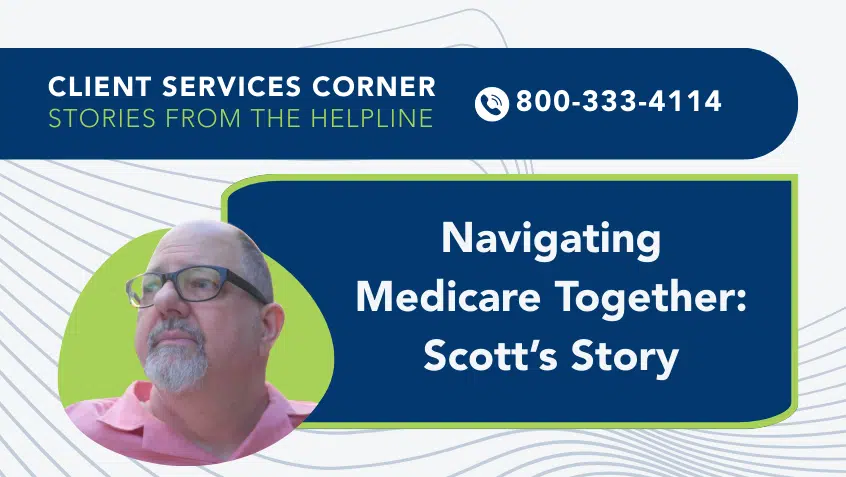Join Us Live for a Discussion on Medicare, Democracy, and the Future of Health Care
Mental Health Screenings and Preventive Care for People With Medicare

Mental health care begins with screenings and preventive care. This National Depression and Mental Health Screening Month, we are highlighting the importance of receiving regular mental health screenings and staying alert to changes in your mental health.
For Older Adults and People With Disabilities
Mental health is a complex issue, and everyone’s experiences and circumstances affect their mental health in different ways. Personal, family, community, and structural factors all influence an individual’s mental health, and adverse circumstances (such as co-occurring health problems, poverty, and inequality) can be particularly detrimental to mental well-being.
Social and structural circumstances can put older adults and people with disabilities at higher risk for depression.
Such social and structural circumstances can put older adults and people with disabilities at higher risk for depression and other mental health problems. People with disabilities face accessibility and mobility barriers as well as systemic discrimination in social and economic life. This makes it especially difficult for people with disabilities to access community and social support independently and regularly. As they age, older adults also experience physical, mental, and social changes that can damage their mental health. New or worsening health conditions can disable and isolate older adults and leave them with inadequate support and accommodations, and social losses caused by bereavement or institutionalization can worsen feelings of sadness and anxiety.
Mental Health Screenings Through Medicare
When you first enroll in Medicare, your provider is required to assess your potential for depression and other mental health conditions during your Welcome to Medicare Visit and first Annual Wellness Visit. This initial assessment includes questions about your family history and other risk factors for depression and other mental health conditions, but it is not necessarily accompanied by a formal screening, which involves a questionnaire about symptoms you may be experiencing.
You do not need to be experiencing symptoms of depression or alcohol misuse to qualify for a screening.
Medicare Part B covers both depression screenings and alcohol misuse screenings once a year if they are part of a primary care visit, such as during your Annual Wellness Visit. These are offered at no cost to the patient when the primary care provider participates in Original Medicare or is in-network with the beneficiary’s Medicare Advantage plan. However, a mental health screening that occurs in an emergency room, skilled nursing facility, or other inpatient hospital or rehabilitation facility is not considered part of primary care and is not covered in the same way.
Mental health treatment can be inpatient or outpatient (including partial hospitalization) depending on the patient’s needs. Inpatient mental health stays are subject to lifetime Part A limits, and cost sharing for both inpatient and outpatient care varies across plans.
You do not need to be experiencing symptoms of depression or alcohol misuse to qualify for a screening, and experts encourage being proactive about seeking mental health care. Getting regular screenings can help you and your doctor catch problems early and find treatment when needed.
Learn more about Medicare’s coverage of mental health screenings and services on Medicare Interactive.
Show Comments
We welcome thoughtful, respectful discussion on our website. To maintain a safe and constructive environment, comments that include profanity or violent, threatening language will be hidden. We may ban commentors who repeatedly cross these guidelines.
Help Us Protect & Strengthen Medicare
Donate today and make a lasting impact
More than 67 million people rely on Medicare—but many still face barriers to the care they need. With your support, we provide free, unbiased help to people navigating Medicare and work across the country with federal and state advocates to protect Medicare’s future and address the needs of those it serves.
The Latest
Most Read
Add Medicare to Your Inbox
Sign up to receive Medicare news, policy developments, and other useful updates from the Medicare Rights.
View this profile on InstagramMedicare Rights Center (@medicarerights) • Instagram photos and videos










One Comment on “Mental Health Screenings and Preventive Care for People With Medicare”
Medicare Harbor
November 6, 2025 at 12:15 pmThank you for shedding light on this critical topic. It’s reassuring to see clear reminders that yearly depression screenings and wellness checks are included under Medicare. At Medicare Harbor, we often encounter seniors unaware of how these preventive benefits can make a real difference in overall health and peace of mind. This kind of information truly empowers beneficiaries to ask the right questions and engage proactively in their care.